

Cognitive ability – APA Dictionary of Psychology. Cognitive Ability - an overview. Dual-Process Models and Implications for Decision Making in Older Adults Cognitive ability is one of the possible contributors to choice set-size performance as well as preference, and dual-process models have been postulated to characterize the role of cognitive ability in decision making.
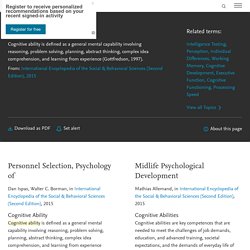
Cognitive Ability - What is cognitive ability? (From ScienceDirect) Normal Cognitive Aging. Normal Cognitive Aging. Cognition: How Your Mind Can Amaze and Betray You - Crash Course Psychology #15. Mild cognitive impairment. Overview Mild cognitive impairment (MCI) is the stage between the expected cognitive decline of normal aging and the more serious decline of dementia.

It can involve problems with memory, language, thinking and judgment that are greater than normal age-related changes. If you have mild cognitive impairment, you may be aware that your memory or mental function has "slipped. " Your family and close friends also may notice a change. But these changes aren't severe enough to significantly interfere with your daily life and usual activities. Mild cognitive impairment may increase your risk of later developing dementia caused by Alzheimer's disease or other neurological conditions. Mild cognitive impairment care at Mayo Clinic Symptoms. Risk factors for cognitive decline and dementia - UpToDate. Dementia is a disorder that is characterized by impairment of cognition, typically involving memory and at least one other cognitive domain (language, visuospatial, executive function).
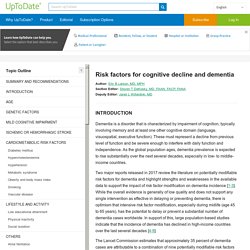
These must represent a decline from previous level of function and be severe enough to interfere with daily function and independence. As the global population ages, dementia prevalence is expected to rise substantially over the next several decades, especially in low- to middle-income countries. Two major reports released in 2017 review the literature on potentially modifiable risk factors for dementia and highlight strengths and weaknesses in the available data to support the impact of risk factor modification on dementia incidence [1-3]. The Lancet Commission estimates that approximately 35 percent of dementia cases are attributable to a combination of nine potentially modifiable risk factors [1]: ●Low educational attainment. Age dependency of risk factors for cognitive decline. Age dependency of risk factors for cognitive decline. Predictors of maintaining cognitive function in older adults. Predictors of maintaining cognitive function in older adults.
The brain-changing benefits of exercise. Study: Physical health is associated with better cognitive functioning. Next time you’re contemplating skipping a workout to finish a project in the office, consider this new finding from a German study: Physical fitness is associated with better brain functioning in young adults.
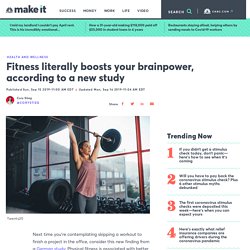
Researchers have long understood that exercise improves people’s cognitive performance, including their executive functioning, attention and memory, as well as their brain structure. In older adults especially, physical activity has been shown to increase the size of the hippocampus, which is the part of the brain responsible for memory, learning and emotion. But Jonathan Repple, M.D., lead study author, and his colleagues were curious if this connection could be found in young adults as well.
They also wanted to see whether it was indeed physical fitness, rather than other factors such as body weight or education status, that was associated with better brain health, he tells CNBC Make It. Dr. The takeaway? Next, Dr. Like this story? Don’t miss: Dr. The takeaway? Regular exercise changes the brain to improve memory, thinking skills. There are plenty of good reasons to be physically active.
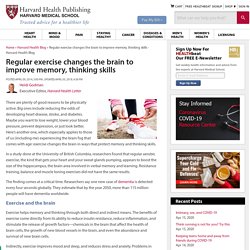
Big ones include reducing the odds of developing heart disease, stroke, and diabetes. Maybe you want to lose weight, lower your blood pressure, prevent depression, or just look better. Here’s another one, which especially applies to those of us (including me) experiencing the brain fog that comes with age: exercise changes the brain in ways that protect memory and thinking skills. Brain Exercises for Dementia: How They Help The Mind. Mind games: a mental workout to help keep your brain sharp. Sharon, a 46-year-old single mother of three teenagers, came to see me about her increasing forgetfulness.
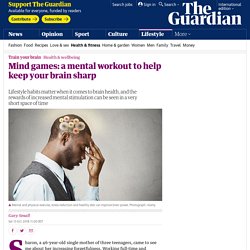
Working full-time and managing her household was becoming overwhelming for her, and she was misplacing lunchboxes, missing appointments and having trouble focusing her attention. She was worried because her grandmother got Alzheimer’s disease at the age of 79, and Sharon felt she might be getting it too – just a lot younger. I said it was highly unlikely that Sharon was suffering from early-onset dementia, but I agreed to evaluate her.
Whenever I consult with people about their middle-aged pauses, I first check for physical conditions or medication side-effects that might be affecting their brain health. Learning new skills keeps an aging mind sharp. Older adults are often encouraged to stay active and engaged to keep their minds sharp, that they have to "use it or lose it.
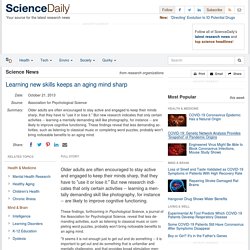
" But new research indicates that only certain activities -- learning a mentally demanding skill like photography, for instance -- are likely to improve cognitive functioning. These findings, forthcoming in Psychological Science, a journal of the Association for Psychological Science, reveal that less demanding activities, such as listening to classical music or completing word puzzles, probably won't bring noticeable benefits to an aging mind. "It seems it is not enough just to get out and do something -- it is important to get out and do something that is unfamiliar and mentally challenging, and that provides broad stimulation mentally and socially," says psychological scientist and lead researcher Denise Park of the University of Texas at Dallas.
"When you are inside your comfort zone you may be outside of the enhancement zone. " Want to keep your brain sharp in old age? Go back to school. New research shows the brain has the ability to function well — and even excel — in old age.

The secret? Keep learning. "Learning is the mechanism for development no matter how old you are," said Rachel Wu, an assistant professor of psychology at the University of California Riverside and the author of research published Wednesday in the Journals of Gerontology, Series B. Wu's study took an ambitious approach: have seniors in their 60s, 70s and 80s immerse themselves in a college-like atmosphere, enrolling in three somewhat rigorous courses simultaneously. Staying Socially Active May Offset Risk of Cognitive Decline. Last month, the big news from the annual Alzheimer's Association International Conference (AAIC) 2019 in Los Angeles was that various lifestyle factors may offset dementia risk.
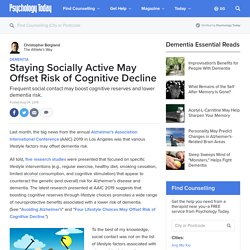
All told, five research studies were presented that focused on specific lifestyle interventions (e.g., regular exercise, healthy diet, smoking cessation, limited alcohol consumption, and cognitive stimulation) that appear to counteract the genetic (and overall) risk for Alzheimer's disease and dementia. The latest research presented at AAIC 2019 suggests that boosting cognitive reserves through lifestyle choices promotes a wide range of neuroprotective benefits associated with a lower risk of dementia. (See "Avoiding Alzheimer's" and "Four Lifestyle Choices May Offset Risk of Cognitive Decline. ") article continues after advertisement Source: Pixabay To the best of my knowledge, social contact was not on the list of lifestyle factors associated with a lower risk of dementia presented last month at AAIC.
Staying Socially Active May Offset Risk of Cognitive Decline. SAGE Journals: Your gateway to world-class journal research. Introduction Dementia is an important and growing individual and public health concern due to high prevalence rate and high burden to patients, family, and society (Kuiper et al., 2015).
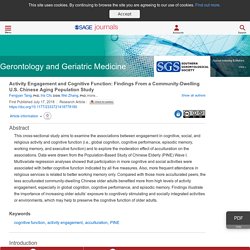
Cognitive function usually declines with aging, especially after age 70 (Aartsen, Smits, van Tilburg, Knipscheer, & Deeg, 2002). However, it is still possible to maintain or even improve cognitive functioning among some older adults (e.g., Korten et al., 1997). Activity Engagement and Cognitive Function: Findings From a Community-Dwelling U.S. Chinese Aging Population Study. Brain foods: the effects of nutrients on brain function. Brain foods: the effects of nutrients on brain function. Nutrition for the ageing brain: Towards evidence for an optimal diet. Akbaraly et al., 2007 T.N. Nutrition for the ageing brain: Towards evidence for an optimal diet. Cognitive function and psychological well-being: findings from a population-based cohort.
We use cookies to enhance your experience on our website.By continuing to use our website, you are agreeing to our use of cookies. You can change your cookie settings at any time. <a href=" Find out more</a> Skip to Main Content. Cognitive function and psychological well-being: findings from a population-based cohort. Mayo Clinic Minute: How to keep your mind sharp. Cognitive Health and Older Adults. Diet, exercise and brain training may help keep the mind 'sharp'
"Dancing, doing Sudoku and eating fish and fruit may be the way to stave off … mental decline," The Guardian reports. A Finnish study suggests a combination of a healthy diet, exercise and brain training may help stave off mental decline in the elderly. The study looked at whether a combined programme of guidance on healthy eating, exercise, brain training and the management of risk factors such as high blood pressure (associated with vascular dementia) could have an effect on dementia risk and cognitive function.
Half of the 1,260 people in this two-year study were randomly allocated to receive this programme, while the other half acted as a control group, receiving only regular health advice. All participants were given standard tests to measure their brain function at the start, and at 12 and 24 months. Researchers found that overall, scores measuring brain function in the group who received the programme were 25% higher than in the control group. Where did the story come from? Diet. Keep Moving to Keep Brain Sharp in Old Age. WEDNESDAY, Jan. 16, 2019 (HealthDay News) -- Staying active in old age may help preserve your memory and thinking skills, a new study suggests. In fact, older people who were physically active kept their minds sharp, even if their brains showed signs of lesions or other markers linked to Alzheimer's disease or other dementias, researchers found.
"Physical activity may provide cognitive reserve" that helps preserve the brain even in the face of dementia, said lead researcher Dr. Aron Buchman. He's professor of neurology at Rush University Medical Center in Chicago. Lifestyle appears to play a major role in keeping the mind sharp as we age, he said.